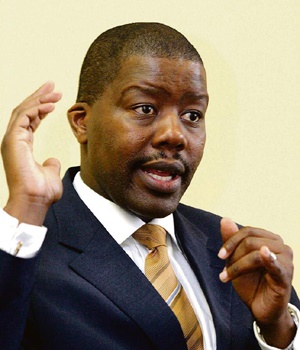
What happened in Nigeria was probably outgoing Tiger Brands CEO Peter Matlare’s Waterloo, he told investors this week.
“One day it will feature strongly in my memoirs,” a contemplative Matlare said during his last interaction with the company’s shareholders.
At the heart of Matlare’s pain is Tiger Brands’ disastrous investment into Nigerian company Dangote Flour Mills.
When he resigned in September, Matlare said he took “full responsibility” for Dangote Flour Mills’ expensive write-downs. Matlare attended his last full-year results disclosure on Thursday, and he was pensive about what had gone wrong in Nigeria.
“No one does not want to succeed,” he told City Press. “I believe it is a strength of our company’s character to admit that we got it wrong.”
While what happened in Nigeria was definitely a lowlight, Matlare said his tenure had been filled with highlights such as recapitalising important projects, and growing the company under some severe financial and market pressures.
“Personally, my time at Tiger Brands has been a steep learning curve,” he said. “I had great fun at the company.”
Matlare will leave Tiger Brands at the end of the year, but has no firm plans for where he’ll go next.
“I’m going to lose this middle-aged spread and take some time out,” he said, adding that he was contemplating several entrepreneurial endeavours.
“My future is a work in progress.”
Matlare joined Tiger Brands from Vodacom at an especially turbulent time. He had to steer Tiger Brands through the bread scandal as well as the Adcock Ingram Critical Care disgrace shortly after he was appointed as CEO in 2008.
But from the outset, he relished the challenge and said it was exhilarating watching the company rebuild its reputation. And despite the setback in Nigeria, Matlare believed that Tiger Brands’ expansion into the rest of Africa was the right move.
“Dangote Flour Mills is a tough example of our growth. There are so many partnerships that we are building in Africa, growing our market.”
Tiger Brands announced that it would finally cut Dangote Flour Mills’ funding, saying it was taking “bold and decisive steps to secure a better future”.
South Africa’s leading consumer goods manufacturer bought Dangote Flour Mills from Africa’s richest man, Aliko Dangote, in 2012. He still holds a 10% equity stake in the company.
At the time, Tiger Brands viewed the acquisition as an important cog in its African expansion. But it cost the company dearly, as the venture became a bottomless pit that ate up shareholders’ capital.
Shares slumped and turnaround strategies crashed.
Matlare eventually fell on his sword two months ago after pressure piled up because of Dangote Flour Mills’ poor performance. Dangote and three other directors also resigned this week.
On Thursday, Tiger Brands said write-downs on Dangote Flour Mills would come to R2.7 billion. Dangote Flour Mills’ overall survival is also in doubt.
Tiger Brands said it was currently exploring various options on its shareholding in Dangote Flour Mills and would endeavour to find a suitable solution for operations going forward.
Matlare said there were a number of reasons the troubled Nigerian acquisition did not fly. He blamed a challenging market, devalued naira, as well as fundamentalist group Boko Haram for the disaster.
Following a sharp drop in the price of crude oil, which is Nigeria’s main export commodity, the naira was devalued and the concomitant effect on the Nigerian macroeconomic environment was widespread, Matlare said.
“We got a lot of it wrong in Nigeria, and the consequences are playing out now,” he said. “Shareholders were clearly upset; we can’t put ongoing investment and money in Dangote Flour Mills.”
Despite its Nigerian challenges, Tiger Brands still recorded a solid performance in its 2015 financial year, driven by its core South African business.
It manufactures some of South Africa’s favourite brands, including All Gold, Tastic, Jungle Oats and Mrs Ball’s Chutney.
Speaking at the announcement of the company’s full-year results, Matlare said turnover rose by 5% to R31.6 billion, and group operating income increased by 3% to R3.7 billion.
He said the group performed well, given the challenging local and international operating environment.
“Local demand continued to be constrained, while competition intensified,” Matlare said, adding that turnover attributable to domestic operations increased by a healthy 6%.
In the year to September 30, Tiger Brands reported a 1% drop in diluted headline earnings a share to 1 756.7c from 1 771.2c a year ago.
Group turnover increased by 5% to R31.6 billion, while profit before tax fell 20% to R2.1 billion compared with a year ago. Tiger Brands declared a gross final dividend of 611c a share.
The company said the outlook remained challenging.
Chief operating officer Noel Doyle will step in as acting CEO from January while Tiger Brands searches for Matlare’s replacement.




 Publications
Publications
 Partners
Partners








